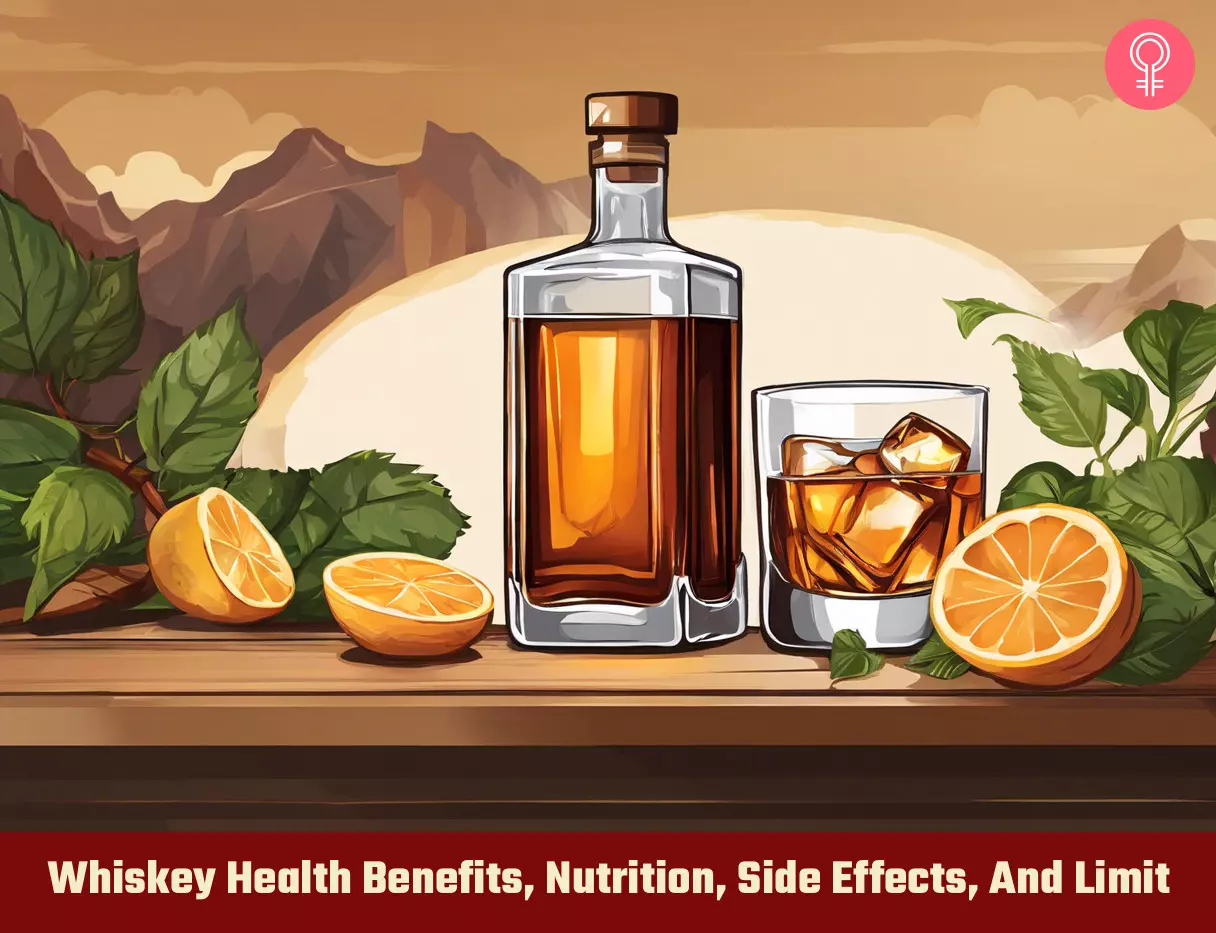This article explores the health benefits of whiskey, its nutrition facts, how much of it can you safely consume, and its side effects. Keep reading.
What Makes Whiskey Different From Other Drinks?
Whiskey, bourbon, and scotch are all similar drinks but have different tastes Who Can Consume It? Everyone of legal age can consume whiskey in moderation How Often? One glass per week. Caution Excess consumption of whiskey can cause cognitive decline and liver tissue injury.
. But, while all scotch and bourbon are whiskeys, not all whiskeys are scotch or bourbon. The processes and containers make a difference here. Whiskey is made with mash from grains like corn, wheat, barley, and rye. It is then allowed to age in charred white oak barrels. However, it cannot age after it is bottled. Bourbon has at least 51% corn content and is aged only in new smoked oak barrels for at least two years. On the other hand, scotch is made in Scotland with only water and barley and is allowed to age for at least three years. Some producers age scotch for up to ten years to enhance its flavor.
Nutritional Profile Of Whiskey
Two fl oz. (around 60 ml) of whiskey contains (1): Whiskey may not be replete with all the nutrients, but it still may offer some health benefits. Let us explore the eight health benefits of whiskey in the following section.
Health Benefits Of Whiskey
1. May Help Lower Cholesterol Levels
Dr. Anthony Puopolo , Chief Medical Officer of Rex MD, says, “Whiskey contains high levels of polyphenols (plant-derived antioxidants) that enter alcohol during fermentation. These antioxidants help lower bad cholesterol (LDL) levels and increase good cholesterol (HDL) levels.” Besides, drinking phenolic-containing alcoholic beverages may also enhance the antioxidant capacity of blood plasma (2).
2. May Benefit Your Heart Health
Research suggests that higher antioxidant levels may help reduce the risk of coronary artery disease (2). In addition, these antioxidants help reduce oxidative stress, which is a major cause of heart disease (3). Research also suggests that the ellagic acid in whiskey may help transport cholesterol from plaque areas and reduce the risk of heart disease (4). Another study linked low to moderate intake of alcohol with the strongest reduction in adverse cardiovascular outcomes (5).
3. May Improve Blood Sugar Levels
Whiskey has a lower glycemic index (it contains slow-digesting carbohydrates). A study suggests that consuming moderate amounts of alcohol may help reduce the risk of type 2 diabetes (6). However, binge drinking has the opposite effect. Dr. Daniel Boyer from Farr Institute says, “Moderate whiskey consumption may lower your risk of developing diabetes by up to 40% because it makes the body properly regulate insulin and glucose levels. Controlling your blood sugar levels lowers the risk of developing diabetes.”
4. May Aid In Digestion
Whiskey is a strong alcoholic beverage. Therefore, a drink of alcohol after a meal may help stimulate digestion (7). “Taking whiskey after consuming a giant portion meal that may result in stomach upsets may help ease your stomach. It does that by stimulating your stomach enzymes since it is high-proof,” remarks Dr. Boyer.
5. May Help Clear Your Sinuses
Research suggests that alcohol, in moderate amounts, can clear sinuses and reduce the congestion in your airways (8). A hot toddy (with hot water, honey, lemon juice, and a shot of whiskey) is believed to help when you are down with a cold.
6. May Help Reduce Cancer Risk
Whiskey contains ellagic acid (a polyphenol) that attacks cancerous cells. The acid inhibits the proliferation of tumor cells, induces apoptosis (cell death), and breaks DNA-carcinogen bindingi The phenomenon of a part of DNA getting bound to cancer-causing chemicals in the body, potentially leading to cancer. . It also blocks virus infection and disturbs inflammation and other processes required for tumor growth (9). “Ellagic acid may absorb rogue cells (rare cells with multiple chromosomes in the body) when combined with other forms of medical treatments,” says Dr. Boyer. However, more specific research is warranted to understand the effects of whiskey on cancerous cells.
7. May Reduce Risk Of Developing Dementia
Studies show that older adults who consumed up to six alcoholic drinks per week had a lower risk of developing dementia (10). More direct studies on whiskey are warranted in this regard. On the other hand, older adults who consumed more than 14 drinks per week reported the most severe cognitive decline compared to those who had less than one drink a week (11). While moderate whiskey intake may offer you these benefits, consuming it in excess may have serious side effects. Keep reading to know more.
8. May Reduce Risk Of Developing Dementia
Studies show that older adults who consumed up to six alcoholic drinks per week had a lower risk of developing dementia (10). More direct studies on whiskey are warranted in this regard. On the other hand, older adults who consumed more than 14 drinks per week reported the most severe cognitive decline compared to those who had less than one drink a week (11). Now that you know the benefits of whiskey, check out some interesting drink recipes to try out. Keep reading!
Whiskey Related Recipes
Discover the versatility of whiskey with these delightful recipes that highlight its unique flavor profile and potential health benefits: Ingredients
2 ounces whiskey 1 ounce lemon juice 0.75 ounce simple syrup Egg white (optional) Bitters
Instructions
Combine ingredients in a cocktail shaker. Shake vigorously with ice. Strain into a rocks glass. Garnish with a lemon wedge.
Ingredients
2 ounces whiskey 1 tablespoon honey 1 ounce lemon juice Hot water Cinnamon stick
Instructions
Combine whiskey, honey, and lemon juice in a mug. Add hot water to fill the mug. Stir in a cinnamon stick for added flavor. Enjoy these delicious recipes and discover the many benefits of incorporating whiskey into your lifestyle.
While moderate whiskey intake may offer you these benefits, consuming it in excess may have serious side effects. Keep reading to know more.
Side Effects Of Excess Whiskey Intake
Excess whiskey intake (or any form of alcohol) may increase the risk of addiction (12). “Alcohol is known for calming your nerves. It increases dopamine production in your body and makes you feel relaxed,” says Dr. Rose. But the craving for alcohol increases if the body gets used to increased dopaminei A neurotransmitter, and one of the feel-good hormones, which affects the feelings of motivation and pleasure. levels (13). Excess intake of alcohol may also increase the risk of heart disease (14). It may also increase blood sugar levels and cause diabetes (6). Besides, drinking more than one drink per day was linked to cognitive decline and dementia (10). One’s liver also sustains the earliest tissue injury from excessive drinking, which may even lead to liver cirrhosisi An illness where healthy liver tissue is replaced by scar tissue, potentially inhibiting liver function. (15). Micheal Thompson, a blogger, recalls his personal experience of how his life positively transformed after quitting alcohol. He became an early addict and stated how he got groped in the pleasure of alcoholism. Soon, he realized that his body was showing signs and added, “I started to get instant headaches and it took me about a year or so to accept the fact that alcohol and I no longer mixed. He later talks about the positive changes in his life and how he feels more happy and more satisfied now (i). Interactions between drugs and whiskey, or alcohol in general, can be dangerous. Let us learn about the common medications alcohol can interact with in the next section.
Drugs That Interact With Alcohol
The alcohol content in whiskey ranges from 40-50%, and it may react with various classes of medicines (16). Some of them include:
Pain relief medications like Aspirin, Tylenol, and Ibuprofen Antibiotics like Erythromycin and Isoniazid Seizure medication like Dilantin Cold medications and cough syrups like Benadryl Medications that prevent blood clots, like Warfarin Antidiabetic medications like Metformin and Chlorpropamide Sedatives like Xanax and Valium Anti-arthritis medications like Rheumatrex Antidepressants like Adapin and Aventyl Herbal medications like chamomile and valerian
Alcohol may prevent these medications from producing the desired effects. It may even lead to excessive drowsiness when taken with sedatives. Hence, avoid intake of all types of alcohol if you are on any of these medications. How much whiskey is safe to drink every day? Which part of the day is best to consume it? Keep scrolling to find out.
The Right Whiskey Limit
As stated above, moderate consumption (one glass per week) of whiskey is recommended to reap its benefits. Moreover, the best time to drink whiskey would be after an evening supper, as digestion slows down at night. Whiskey could also be a good option if you have a big meal at any time of the day and think you need a digestif to help (provided you weigh your options right). Is whiskey good for sleep? Yes. Many compounds in whiskey stimulate the neurotransmittersi Chemical messengers in the nervous system that help regulate breathing, brain functioning, and blood flow to the muscles. in sleep, resulting in sleep-inducing effects (17). Is whiskey better than beer? No. Whiskey is a hard spirit and has higher alcohol content than beer. Drinking more whiskey is more harmful than drinking more beer (18), (19). Is whiskey good for the skin? Maybe. Whiskey is rich in ethanol that acts as an antiseptic and disinfectant. However, excess use may dry the skin out (20).
Illustration: Whiskey Health Benefits Nutrition Side Effects And Limit
Check out this video to learn the top 5 health benefits of whiskey! Discover how whiskey can help improve your heart health, reduce stress, and more!












